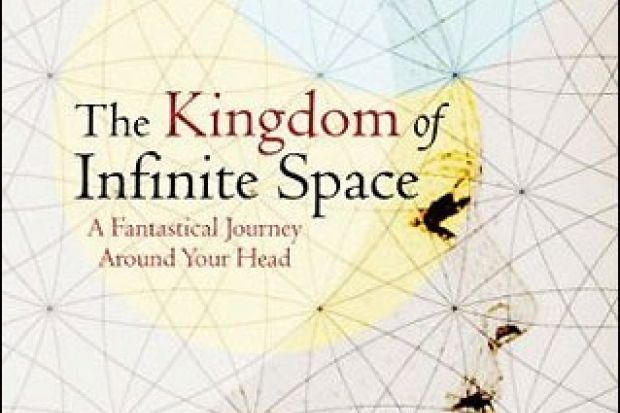Raymond Tallis isn't happy with neuroscience and neurophilosophy because - how else to say it? - he finds them too cerebral.
In a nutshell, The Kingdom of Infinite Space is therefore not about brains, but about heads, that "strange zeugma of intelligence and meat, of thought and bone". The 5kg of biological kit carried on our necks is a remarkable evolutionary achievement, packing in the body's control systems, major sensory systems, orifices for admitting food and air, and a panoply of glands, tubes and miscellaneous junk to keep it all fed and watered.
Tallis finds nothing about heads uninteresting. He talks of secretions, from sweat and saliva to tears ("eye-pissing"), and from mucus to earwax and hair ("as a secretion ... somewhere between earwax and toenails"). Heads also carry our face and its adornments, from mustachios to make-up and metallic piercings, making faces for Georg Christoph Lichtenberg "the most interesting surface on earth", and for Tallis "the most sign-packed surface in the universe".
The head's behavioural repertoire includes eating, swallowing, vomiting, drinking and kissing (and a kiss is never just a kiss); breathing, whistling, humming, singing, smoking and laughing (and while ha-ha-ha, ho-ho-ho, cha-ha-ha and ha-ho-ha are possible, ha-ho-ha-ho is not); coughing, sneezing, hiccupping, smiling, looking and gazing (Here's looking at you, kid!); and winking, hearing, singing, nodding, dozing and sleeping (the Little and the Big). Most glorious is surely speech, with evolutionary theories summarised as: "ding-dong" (imitating object sounds), "bow-wow" (imitating animals), "pooh-pooh" (sounds of pleasure and pain), "ta-ta" (mutated hand gestures), "yo-he-ho" (modified work chants) and "uh-oh" (modified warning grunts).
Tallis's reservoir of head stories seems endless, as with the curious case of saliva. Reading thus far you will have swallowed to dispose of excess saliva (and if not, think of sucking lemons and Pavlov does the rest). Every day a litre of saliva is swallowed, in polite society anyway. Strangely we are hardly aware of it, until nerves dry the flow, or at the dentist, when our mouth runneth over. Does saliva have a taste and a texture? Do we even think about swallowing it? Is it even ours? Anthony Storr's revolting thought-experiment imagines that instead of swallowing, we spit our saliva into a glass. Saliva is swallowed all day long at source, so how about swallowing that glass of cold spit? "No way" is the general answer, not even with vodka, lemon and ice. In our mouth that saliva was ours, despite now being mere spittle. But, as Tallis says, some belonging still exists, for imagine instead a glass of someone else's saliva ...
The Kingdom of Infinite Space is a phenomenological celebration of the quotidian biological processes essential to life that often slip beneath cognition but underpin social actions and linguistic tropes. With playful wit, endless puns and allusions, occasional Joycean fugues and personal digressions, Tallis reflects on the social, cultural and emotional meanings of every aspect of a head's appearance, secretions and actions, his elegant prose making the mundane extraordinary. As when, of the salt-water of tears, Tallis reminds us, "Saline may not be an argument ... but (tears) make arguments seem feeble, dry, calculating things."
Tallis is a physician by training but a philosopher at heart. Sir William Osler once suggested that "the Art of Detachment" would allow a physician "to take a panoramic view of the conditions under which he has lived and moved ... see(ing) the realities as they are", the process requiring "the exercise of the highest faculties of description and imagination as for the deepest philosophic insight". From medicine surely comes Tallis's philosophical pragmatism and realism, and I find myself returning to Jonathan Miller's description of medicine: "One foot ... in the physical world, electronic impulses and the muck of the human body; the other ... in the subjective experiential world of consciousness and conduct", with "the great divide between the scientifically describable and the artistically describable sides of human beings." That is surely Tallis's project. Philosophers perhaps need excursions into the muck and mess of reality, as with Wittgenstein fighting on the Russian front in the First World War and working in hospitals in the second.
Philosophically, Tallis is "very attracted by the idea of phenomenology as a philosophical method and ambition", and the deeper story behind this book is examining the confusion and messiness of embodiment - what bodies mean, what bodies tell us about minds, consciousness and experience, and the failings of computers and neural models to explain any of it satisfactorily. Our heads are where we feel we are, the centre of egocentric space, the "capital of the first-person world". And yet "how little of our head is available to us", for there is a vast "gap between the facts about our head ... and the immediate experiences of our head".
Tallis devotes little space to that over-fetishised organ, the brain, although he knows that brains have their uses, for "the nick my brain is in and the nick my mind is in are closely correlated". Damage that soft grey semi-liquid matter and, well, never mind. For Tallis, though, understanding minds is far more than understanding brains, and he distances himself from the "neuromythologists", for whom brain alone explains sensations, perceptions, emotions, selves and persons; "the brain is a necessary condition for all forms of consciousness ... It is not, however, a sufficient condition", and "this is where neuroscience lets us down. Somehow, bursts of electricity in the wetware of the brain don't seem adequate to the exquisitely structured mind that I, and you, have."
Thoughts, for Tallis, cannot simply be clusters of neural activity, for then "the thought that my thought is a collection of nerve impulses (would itself be) a collection of nerve impulses. That is one bit of rather sophisticated biochemistry." Much of the problem concerns the location of thoughts. "Earwax is in my head. Mucus is in my head. My brain is in my head. But are my thoughts in my head?" Thoughts are doubly perplexing because they contain the world outside, and hence "My head ... contains the world that contains it."
Throughout Tallis's work runs the theme of how humans differ from other animals. While "animals live their lives, humans lead them"; "only humans cry or weep as an emotional reaction"; there is a "gulf between the way humans and all other animals interact with their food"; and humans are "the only animals who are conscious of ... our own appearance". Aristotle, Whitehead and Marx are also invoked, emphasising that only humans laugh and weep, cultivate emotions for their own sake, and produce the means to their own subsistence. In the ultimate triumph, "our heads have lifted themselves above the organic material of which they themselves are made".
Chris McManus is professor of psychology and medical education, University College London.
THE AUTHOR
Not every academic can claim to be television presenter Kirsty Young's choice of companion on Desert Island Discs. In fact, only one can - Raymond Tallis, who beat Paul Weller ("some sort of musician") to the accolade. And when looking at Tallis's career as a gerontologist, philosopher, poet, novelist and cultural critic, it is easy to see why he would be a very good companion indeed.
Tallis trained as a doctor at the University of Oxford and St Thomas' Hospital, qualifying in 1970. He was professor of geriatric medicine at the University of Manchester and a consultant physician in Salford before becoming a full-time writer. Working for the NHS did not stop him from becoming one of its fiercest critics; his book Hippocratic Oaths spoke out against "unthinking voices" corrupting the service.
He has not limited himself to writing about the NHS or his specialist subject of epilepsy in older people. In the past 20 years he has produced fiction, three volumes of poetry, and more than a dozen books ranging from philosophical anthropology to literary theory. He enjoys writing in local cafes, where he can be easily spotted. Not only does he wear ear protectors, but proprietors often advise other customers not to make eye contact or approach him.
Combining his vast career with a family life, it is little wonder that he has scant time for hobbies. Still, he lists his interests as music, thinking, his family and Stella Artois.
When asked if those interests are in order, Tallis is adamant: "No, definitely Stella first. If I had a girl I would have called her Stella. Or Export - that's a nice name for a girl."
- Sarah Cunnan
The Kingdom of Infinite Space: A Fantastical Journey around Your Head
By Raymond Tallis
Atlantic Books, 324 pp, £19.99
ISBN 9781843546696
Published 21 April 2008
Register to continue
Why register?
- Registration is free and only takes a moment
- Once registered, you can read 3 articles a month
- Sign up for our newsletter
Subscribe
Or subscribe for unlimited access to:
- Unlimited access to news, views, insights & reviews
- Digital editions
- Digital access to THE’s university and college rankings analysis
Already registered or a current subscriber? Login




